In our world, digital device users tend to be most concerned about their privacy. Whether using an iPhone or Android, we highly value our privacy. The majority of people choose iPhone over Android for the sole purpose of security and privacy. We cannot deny that Apple is one of the first devices with improved privacy and security.
Private browsing is another way to have secure browsing, and most people prefer it while using unknown devices or visiting doubtful websites.
However, a question still haunts some people; Can private browsing be traced on iPhone? Well, this question has different answers depending on multiple factors. Let’s dive in to help you discover exactly what you need.
Table of Contents
What is Private Browsing?
It is a privacy feature given by many web browsers. In the private mode, you can use the browser without allowing it to store the data.
Many internet users believe that private browsing or incognito mode makes them untraceable. The private browsing mode aims to make browsing safer than regular browsing by storing your temporary data.
The private browser does not save your search history and cookieson your iPhone. Instead, it covers your incognito browsing history, password input, and other traces. But does that imply that private browsing on an iPhone cannot be tracked? Let’s answer a few questions about it.
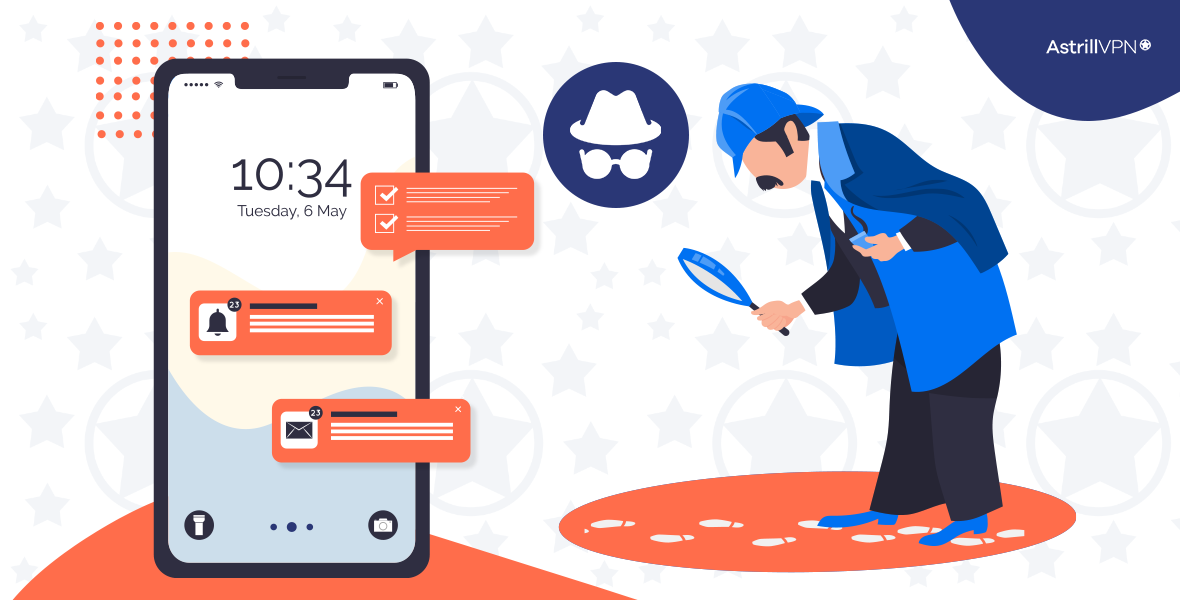
Is Private Browsing private, and what does it not do?
No, even if you are using the private mode, your internet service provider, cellular service provider, websites you visit, network administrators (like your employer or school who control the network), and government agencies might be able to track your online activity. No matter what surfing mode you’re in, they can keep an eye on you and observe your online traces.
How to turn on Incognito mode on iPhone, aka private browsing?
Follow these simple steps to turn on/off private browsing on your iPhone:
- Unlock your iPhone and open the Safari app.
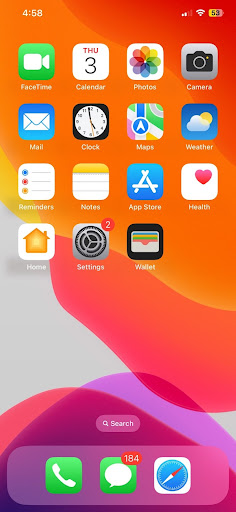
- Tap the tab icon in the bottom-right corner of the screen.
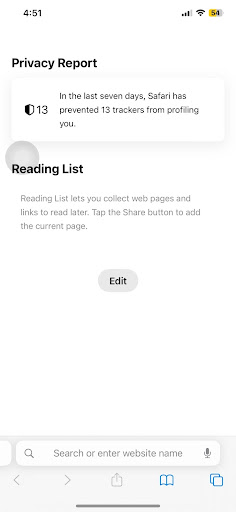
- Now, tap the “Private” button located in the bottom-left corner.
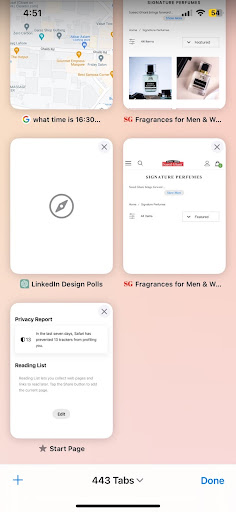
- A prompt will appear; tap “Close” to proceed.
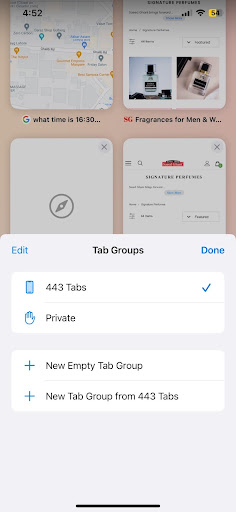
- The Safari interface will turn dark, indicating that private browsing is now active.
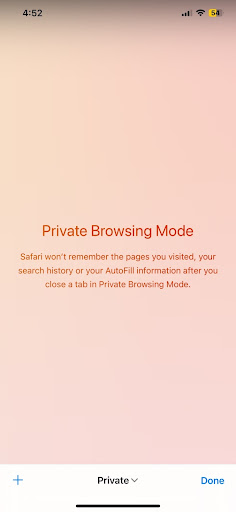
- To verify that private browsing is on, look for the “Private” indicator at the top-left corner of the Safari interface, next to the address bar.
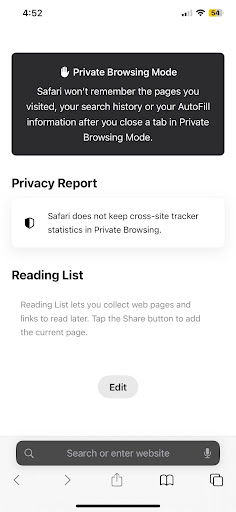
- To exit private browsing, tap the tab icon again.
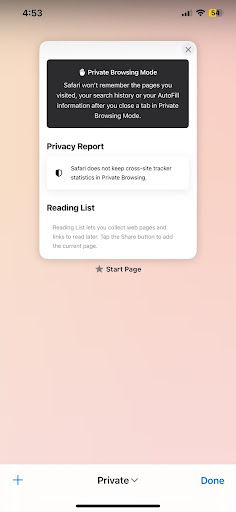
Can private browsing be tracked on iPhone?
There is always the impression that it is a superior choice to Android, but there is still a flaw.
When you browse normally, information such as your passwords, browsing history, cookies, and more are saved. Third-party websites that value it for marketing can access such data. You can switch to private mode if you don’t want to save that information.
Although the browser won’t save your information, you can still be tracked. The same applies to your IP address, bookmarks, and traffic-related information.
How to avoid user tracking on Safari?
A few simple Safari settings can make a big difference.
- Safari has built-in tools to limit how much data websites can track about you and your browsing history. First, open the Safari settings by clicking the gear icon at the top right of the window. Under the “Privacy & Security” section, you’ll see some key options.
1. Turn on “Prevent cross-site tracking.”
This prevents advertisers and other third parties from using cookies and other data to track you across multiple sites. Instead, Safari assigns you a random user identifier for each site, making it harder to build a full profile of your browsing habits.
2. Enable “Block all cookies”
Enable this option and select “From third parties and advertisers.” This limits cookies only to the specific site you’re visiting, blocking others that try to set a cookie. Again, this reduces how much data advertisers can collect about you.
3. Turn on “Hide IP address.”
Under the “Advanced” tab, turn on “Hide IP address.” This masks your actual IP address when visiting websites, making it difficult for companies to identify you based on your network connection. Safari will instead give websites a generic IP address for your region.
With these Safari settings adjusted, you’ll have more privacy when browsing the web. Sites will find it harder to track you across the internet and collect data to build profiles about you. Give these privacy tweaks a try – you may be surprised at how much more peace of mind you have while browsing!
Common ways Private Browsing can be traced on an iPhone
Yes, spy apps can track your data, but how can anyone, or even a network administrator track private browser data on iPhone? There are four common ways.
● IP address
Every home has an address, and every computer or other electronic device online has an IP address. Simply visiting the website falls within this category because your device must get the text, fonts, and images. As a result, a website can keep track of the time, IP address, and duration of each access. During a Private browsing session, the servers for the websites you visit will still be able to see your connection’s IP address. Technically, this is essential. Similar to how the post office needs a street address to deliver a letter, websites need an IP address to send their data to.
● Social media Account activity
If you sign into Facebook using Private Browsing, Facebook still recognizes you. In reality, the easiest way to render any privacy protection measures you employ useless is just login into your account.
● Internet service provider
Internet Service Providers (ISPs) cannot track specific activity within a private browsing session. Private browsing prevents the browser from saving local data related to the user’s online activities. This includes browsing history, search history, cookies, and cached files.
When you use an iPhone private browser, the data generated during the session is not stored on your device. However, it is essential to understand that private browsing does not make you completely anonymous online. While ISPs cannot see the websites you visit or the searches you conduct during a private browsing session, they can still observe your internet connection, know that you are using private browsing, and monitor your overall internet activity.
● Apple can trace your internet traffic too
The website may not store cookies while browsing in a private mode. However, Apple itself stores your data. This applies to all devices of apple and not only just the iPhone.
How to Increase Privacy When Browsing the Web?
The Internet is only sometimes safe for browsing. Yes, we can name some browsers with safety features for it. Still, it would be best if you were careful.
To defend their population from terrorists or other enemies, numerous governments are looking into a sizable chunk of Internet-based activities. Additionally, APT (advanced persistent threat) groups actively attempt to access your internet accounts, private information, and communications.
When talking about security, it’s crucial to be precise and unambiguous. Security is not a single idea, approach, or condition.
It integrates several components, tactics, and perspectives. Instead of referring to the ultimate objective that a person or organization can successfully achieve, security is typically used to describe a relative term with gradated degrees.
● Clear Browsing History on iPhone
Clear before proceeding to any other way.
- Remove history: Go to Settings > Safari and select Clear History and Website Data to erase your browsing history and cookies.
- Remove cookies: Go to Settings > Safari > Advanced > Website Data, then press Remove All Website Data to delete your cookies while keeping your browsing history.
● Use Private Mode in Safari on iPhone
Make sure iOS 16.2 is the most recent version installed on your iPhone. Launch Safari, select the new page option, select Private, and then select Done.
- To end the private mode: Tap the new page button > Private > Done to end Private Browsing.
However, remember that there are better choices than Safari as a browser. Therefore, you must prefer other browsers such as Tor and brave for safe search.
● Hide IP Address
You may also choose to mask your IP address on your iPhone or iPad in Safari. Hit the Settings button on your iPhone. Click on Hide IP Address in Safari. Select From Trackers next. This setting will ensure that your IP address is concealed from trackers even though websites can still see it.
● Using Chrome’s Incognito Mode
If you use Google Chrome, you are probably aware of the ability to enter Incognito Mode. Follow these steps to enable Chrome’s Incognito Mode:
- Click the three dots on Google Chrome after opening it. Open a new tab incognito. Using the tab, you can now browse privately. Downloads and bookmarks are still accessible unless you actively remove them.
Remember that even in chrome, the search history is not concealed from the websites you visit or your ISP, while incognito mode in iPhone is enabled; it is only hidden from your device. This implies that your actions are still able to be monitored.
● Use iCloud Private Relay to browse the web with more privacy
You can activate iCloud Private Relay after signing up for iCloud+ to help stop websites and network providers from compiling extensive profiles of you. The traffic leaving your iPhone is encrypted and relayed across two different internet relays when iCloud Private Relay is enabled. This stops websites from accessing your IP address and precise location and also stops network providers from monitoring your Safari surfing habits.
● Use VPN for private browsing
All your data is encrypted on your device and sent via Astrill VPN servers. Your ISP or place of employment will only be able to see an encrypted connection to the server; however, the network service provider can still see the server’s IP. Additionally, this protects your data from Wi-Fi router-based spying. So, try Astrill VPN for a better way of private browsing. Its multi-hop VPN and budget-friendly plans keep it up to date.
Overall, internet anonymity is difficult, but you may be much more private by following the best practices mentioned in this article.
● Disable extensions
Only if you’ve enabled all your customary addons for Private Mode; return and turn them off to stop tracking. This is true for extensions connected to your social media, email, and other accounts.
● Use Google Search in Incognito Mode on iPhone
On iPhones, Google Search may require two applications. They are made up of the Google app and the Chrome browser. You can access private mode in a private window. To access the dropdown menu, open a new tab and click on the three vertical dots in the top right corner. Here, you will see the option of New Incognito Tab; click it to browse privately.
● Remove malware
Since many privacy tools are not made to fool them, malware can get around them. Verify that your iPhone is malware-free. It’s always a good idea to scan your smartphone for viruses and malware.
Why users opt for private browsing on iPhone
Here are the key reasons why users choose to use private browsing on their iPhones:
- Private mode Safari prevents browsing history, search history, and website data from being stored on the device.
- Blocks cookies and prevents websites from tracking user behavior for targeted advertising.
- Ensures no sensitive information is stored after the session ends, enhancing security on shared or public iPhones.
- Keeps browsing history clean, especially when users need to research confidential or sensitive subjects.
- It provides a certain level of anonymity by not associating browsing activities with the user’s identity.
- Enables web developers to test websites without cached data, ensuring unbiased experiences.
- Disables Autofill, preventing the iPhone from automatically filling in sensitive form data.
- Allows simultaneous logins on the same website without conflicting cookies or sessions.
- Ideal for visiting websites without leaving traces on the device.
- Offers some protection against certain tracking mechanisms, such as browser fingerprinting.
FAQs
● Can anyone see your personal browsing history?
Your browsing history is hidden from other device users while you browse privately. Your browsing history and form data are not saved in browsers. When you quit Incognito mode, cookies and site data are removed, but they are remembered while browsing.
● Is Safari private traceable?
Private Browsing Mode is a convenient privacy tool for Safari users who want to conceal their browser records quickly. But that is the extent of its privacy protection. Even if you utilize Private Browsing, you may still be tracked.
● Is private browsing mode untraceable?
Your browsing history, cookies, site data, and any data you enter on forms are not saved on your device in private. This implies that other users of your device won’t be able to view your activity because it won’t appear in the history of your Chrome browser.
● Does Safari’s private mode stop tracking?
Your internet activity is not hidden from third parties like the websites you visit, advertising, ISPs, the government, or hackers when you use private browsing. Additionally, using private Browsing on Safari does not stop online monitoring.
● Does Safari private browsing hide IP address?
When you use private browsing on Safari, your IP address is hidden from the websites you visit. Private browsing in Safari opens a temporary browser window where your history, cookies, and other data are not saved after you close that window.
This means that websites see you as a “new” visitor each time you open a private browsing window. They have no record of your previous visits, searches, or activity. Since websites typically identify you with a combination of your IP address and browser data, private browsing helps separate your identity from each private browsing session.
● Can private searches be tracked?
Private searches can be tracked and monitored in various ways, though most people assume their searches are anonymous. Internet service providers (ISPs) and search engines themselves are able to see and log all search queries.
ISPs have full visibility into your online activity since they provide you with internet access. They can see every website you visit and every search you perform. While ISPs do not actively monitor individual customers, they do store search logs that can be accessed if needed for investigations.
Bottom line
All in all, it is possible to trace your private browsing on the iPhone not by the other user of the system but by your network provider and system administrator. So, it is the best choice to use VPN even when you are privately browsing on your phone.


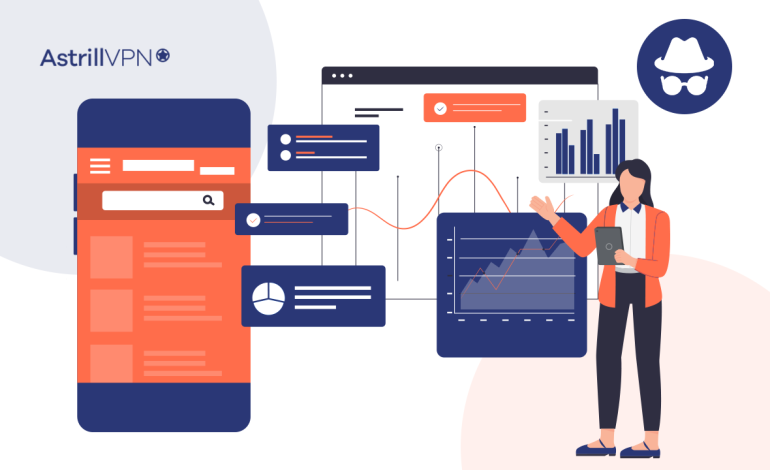
No comments were posted yet